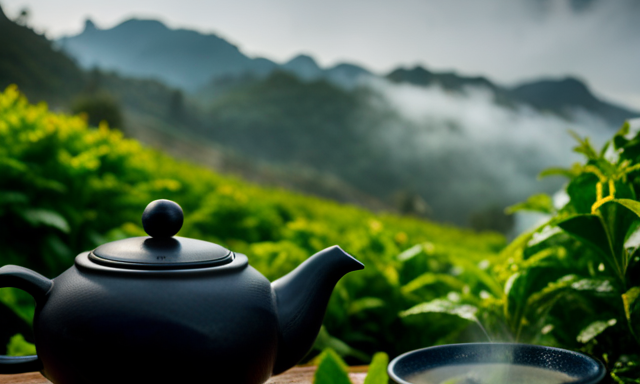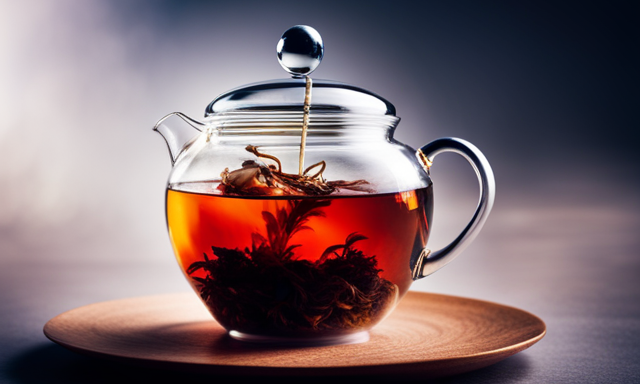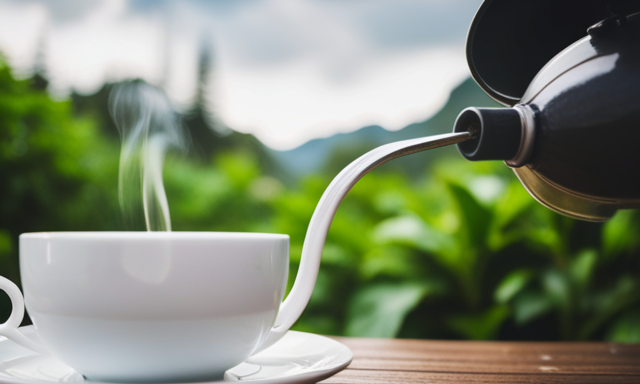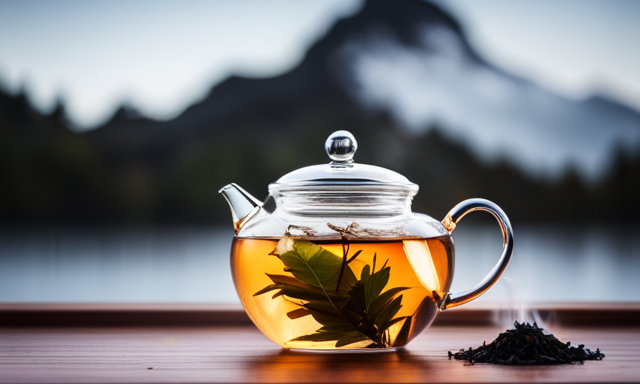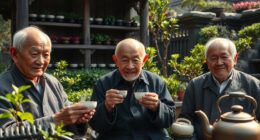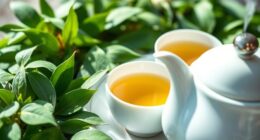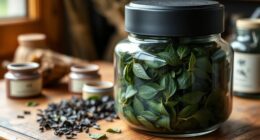As an avid tea enthusiast, I’ve always been intrigued by the intricate world of caffeine content in different types of tea. Oolong tea, in particular, has captivated my attention due to its unique flavor profile and supposed health benefits. But the burning question that lingers in my mind is, ‘How much caffeine does oolong tea really contain?’
In this article, we will delve into the origins and processing of oolong tea, understand the effects of caffeine, compare caffeine levels in different types of tea, and explore factors that affect the caffeine content in oolong tea.
Additionally, I will share tips on how to brew oolong tea to control caffeine levels and discuss the recommended daily consumption of this delightful beverage.
So, join me on this caffeine-fueled journey as we uncover the secrets of oolong tea and its caffeine content.
Key Takeaways
- Oolong tea is made from the leaves of the Camellia sinensis plant and undergoes a complex process of withering, oxidizing, and fermenting.
- The caffeine content in oolong tea can vary from 37-55 mg per 8-ounce cup, depending on factors such as steeping time and the specific oolong variety used.
- It is possible to control the caffeine levels in oolong tea by adjusting the steeping time and selecting oolong varieties that are naturally lower in caffeine.
- Oolong tea offers numerous health benefits, including antioxidants, polyphenols for weight management, and support for healthy blood sugar levels.
The Origins and Processing of Oolong Tea
You’ll be captivated by the rich history and meticulous craftsmanship that go into creating every batch of oolong tea.
The origins of oolong tea can be traced back to China, where it has been cultivated for centuries. This unique tea is made from the leaves of the Camellia sinensis plant, which are withered, oxidized, and partially fermented to create its distinctive flavor profile.
The processing of oolong tea requires great skill and attention to detail, as the leaves must be carefully monitored throughout the various stages of production. The leaves are hand-picked and then undergo a complex process of withering, rolling, and drying. This meticulous craftsmanship ensures that each cup of oolong tea is a true masterpiece.
Understanding the caffeine content and its effects on the body is crucial in appreciating this remarkable beverage.
Understanding Caffeine and its Effects
Surprisingly, understanding the impact of caffeine on our bodies can be quite eye-opening.
Caffeine metabolism varies from person to person, with some individuals being fast metabolizers and others being slow metabolizers. This means that the effects of caffeine can differ greatly depending on the individual.
Additionally, caffeine has a half-life of around 5-6 hours, which means that it can stay in our system for a significant amount of time. This can have implications on our sleep patterns, as caffeine can interfere with the quality and duration of sleep. It is important to understand how caffeine affects our bodies and to be mindful of our consumption, especially in the hours leading up to bedtime.
Now, let’s delve into comparing the caffeine levels in different types of tea.
Comparing Caffeine Levels in Different Types of Tea
When comparing different types of tea, it’s important to consider the varying levels of caffeine they contain and how it may affect your body.
In terms of caffeine content, oolong tea and green tea are two popular options. Oolong tea typically contains around 37-55 mg of caffeine per 8-ounce cup, while green tea has slightly less at 20-45 mg per cup.
It’s worth noting that these values can vary depending on factors such as the specific brand, brewing method, and steeping time.
As for the effects of caffeine on sleep quality, it’s generally recommended to avoid consuming caffeine close to bedtime as it may interfere with your ability to fall asleep.
Moving on to the next section about factors affecting caffeine content in oolong tea, it’s interesting to explore how these levels can be influenced.
Factors Affecting Caffeine Content in Oolong Tea
One factor that can significantly impact the caffeine content in oolong tea is the duration of the steeping process. The longer the tea leaves are steeped, the more caffeine is extracted into the brew. This is because caffeine is a water-soluble compound that is released from the tea leaves during the steeping process.
Therefore, if you prefer a lower caffeine content in your oolong tea, you can reduce the steeping time.
Another factor that can affect the caffeine content is the type of oolong tea used. Different varieties of oolong tea may have varying caffeine levels naturally present in the leaves.
It is important to consider these factors when brewing oolong tea to control caffeine levels. By adjusting the steeping time and selecting a specific type of oolong tea, you can enjoy your cup of tea with the desired caffeine content.
How to Brew Oolong Tea to Control Caffeine Levels
To control the caffeine levels in your brew, start by adjusting the steeping time and selecting a specific variety of oolong.
Brewing techniques play a crucial role in determining the caffeine content in your tea. If you prefer a tea with lower caffeine levels, opt for a shorter steeping time of around 1-2 minutes. This will help extract fewer caffeine compounds from the tea leaves.
Additionally, choosing a variety of oolong that is naturally lower in caffeine can further reduce the overall caffeine content in your brew.
By carefully controlling these factors, you can enjoy a cup of oolong tea that suits your desired caffeine levels.
Now, let’s explore the health benefits of oolong tea and why it’s a popular choice among tea enthusiasts.
Health Benefits of Oolong Tea
Oolong tea offers a multitude of health benefits that make it a beloved choice among tea enthusiasts. This traditional Chinese tea is packed with antioxidants that can help reduce the risk of chronic diseases, such as heart disease and certain types of cancer. It also contains polyphenols, which can aid in weight management by boosting metabolism and promoting fat oxidation.
Moreover, oolong tea has been shown to support healthy blood sugar levels and improve insulin sensitivity, making it beneficial for individuals with diabetes or those at risk.
To maximize the health benefits of oolong tea, it is important to brew it using the right techniques and water temperature. These factors can affect the release of antioxidants and other beneficial compounds.
Transitioning into the subsequent section about recommended daily consumption, it is important to understand the appropriate amount of oolong tea to experience these health benefits.
Recommended Daily Consumption of Oolong Tea
For those looking to reap the health benefits of this delicious beverage, incorporating a few cups of oolong tea into their daily routine can be a delightful and beneficial choice.
When it comes to the recommended daily intake of oolong tea, it is generally recommended to consume around 2-3 cups per day. This amount is considered to be an ideal balance for enjoying the positive effects of oolong tea without going overboard.
Additionally, oolong tea has been associated with aiding in weight loss, making it an even more attractive option for those looking to shed a few extra pounds.
By incorporating oolong tea into your daily routine, you can enjoy its numerous health benefits while managing your caffeine sensitivity.
Moving forward to the next section about managing caffeine sensitivity with oolong tea, let’s explore some helpful tips.
Managing Caffeine Sensitivity with Oolong Tea
If you’re someone who struggles with caffeine sensitivity, managing it while still enjoying the benefits of oolong tea can be a game-changer. Oolong tea contains less caffeine than black tea but more than green tea, making it a suitable option for those looking to reduce their caffeine intake.
Here are three ways to manage caffeine sensitivity with oolong tea:
-
Choose lighter varieties: Oolong teas vary in caffeine content depending on factors like oxidation level and brewing time. Opt for lighter varieties, such as green oolong or pouchong, which generally have lower caffeine levels.
-
Limit consumption: Be mindful of how much oolong tea you consume in a day. Start with smaller servings and gradually increase if your sensitivity allows.
-
Time your tea: Drink oolong tea earlier in the day to give your body enough time to metabolize the caffeine before bedtime.
By managing caffeine sensitivity and reducing caffeine intake with oolong tea, you can still enjoy its unique flavors and potential health benefits.
Now let’s explore other considerations when choosing oolong tea.
Other Considerations When Choosing Oolong Tea
When selecting your oolong brew, it’s important to consider factors such as flavor profiles, origin, and brewing techniques.
Oolong tea is not only known for its rich taste but also for its potential benefits in weight loss and digestion. Studies have shown that oolong tea can help boost metabolism and aid in burning fat, making it a popular choice for those looking to shed a few pounds. Additionally, oolong tea has been found to promote healthy digestion by reducing inflammation in the gut and improving gut health. These benefits make oolong tea a great choice for those seeking a natural way to support their weight loss goals and improve their digestive health.
Transitioning into exploring different varieties and flavors of oolong tea, there are endless options to choose from, each offering its own unique taste and aroma.
Exploring Different Varieties and Flavors of Oolong Tea
When considering the various aspects of oolong tea, it’s important to explore the different varieties and flavors available. Each type of oolong tea has its own unique flavor profile, offering a delightful range of tastes to discover.
From the floral and fruity notes of a Tie Guan Yin oolong to the rich and roasted flavors of a Da Hong Pao, there is a wide variety to choose from.
To fully appreciate the nuances of these flavors, it’s crucial to understand the proper brewing techniques for oolong tea. The water temperature, steeping time, and brewing vessel all play a role in bringing out the best flavors in your cup of tea. Experimenting with different brewing methods can enhance your tea-drinking experience and allow you to appreciate the intricacies of each variety.
When exploring the world of oolong tea, take the time to savor the different flavor profiles and try out different brewing techniques to discover your personal favorites.
Frequently Asked Questions
Does oolong tea contain more caffeine than black tea?
Oolong tea, with its delicate balance of flavors, is a wonderful choice for both heart health and mental alertness. While it does contain caffeine, it is not necessarily higher than black tea.
Can oolong tea help with weight loss?
Yes, oolong tea can potentially aid in weight loss. It has been suggested that oolong tea can boost metabolism and assist with appetite suppression, making it a valuable addition to a healthy diet and exercise routine.
Is it safe to drink oolong tea during pregnancy?
Drinking oolong tea during pregnancy is generally considered safe. There is no evidence linking oolong tea to birth defects or miscarriage. However, it’s always best to consult with your healthcare provider for personalized advice.
Does oolong tea have any antioxidants?
Yes, oolong tea contains antioxidants that offer various benefits, including promoting heart health. These antioxidants help to reduce inflammation and protect against oxidative stress, which can improve cardiovascular function.
Can oolong tea help improve digestion?
Oolong tea can help improve digestion by promoting gut health and reducing bloating. It contains compounds that aid in digestion and regulate the gut microbiota, leading to better digestive function.
Conclusion
In conclusion, oolong tea is a versatile and delicious beverage that offers a moderate amount of caffeine.
While some may argue that the caffeine content in oolong tea is too high, it is important to consider that oolong tea provides numerous health benefits and can be enjoyed in moderation.
By understanding the factors that affect caffeine content and brewing methods, individuals can control their caffeine intake.
Overall, oolong tea is a great option for those looking for a flavorful and energizing beverage that can be enjoyed throughout the day.

